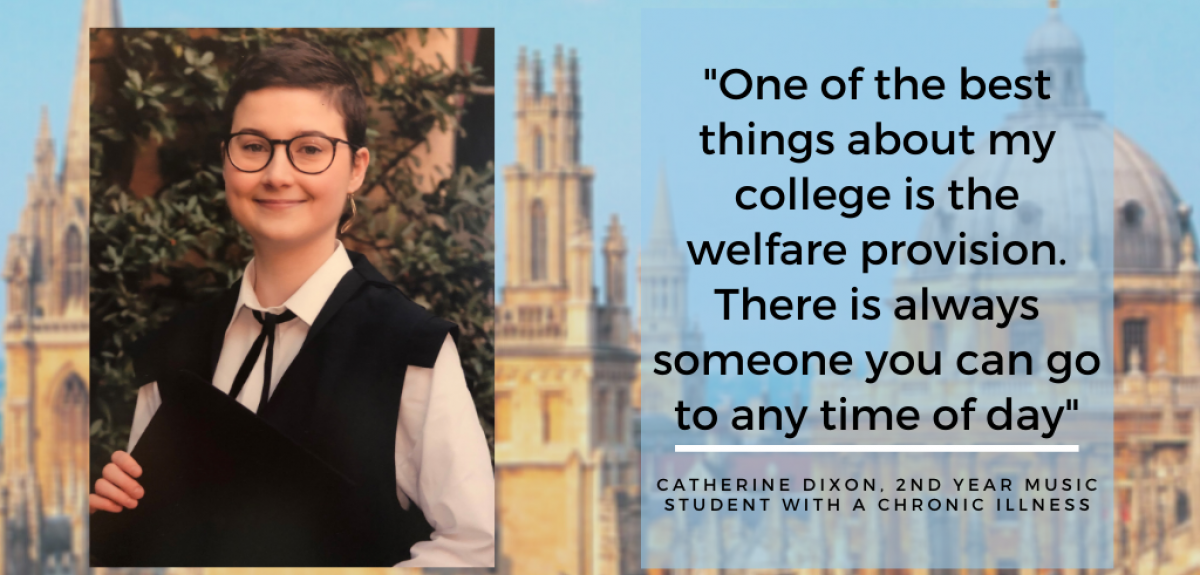
What it's like to study at Oxford as a student with a chronic illness
Catherine Dixon is a second year undergraduate student studying Music at Merton. Catherine has a chronic illness which can make studying, and life in general, very difficult. A chronic illness is a condition that lasts a year or more and requires ongoing medical attention or limits daily life, often both.
Catherine, who suffers from lupus, autoimmune pancreatitis and diabetes insipidus shares her story of applying to and studying at Oxford with a chronic illness.
What was it like applying to Oxford as someone with a chronic illness?
When I was making my application my first hurdle was finding universities that would accept my grades. I became unwell in sixth form and had to drop out of school. I completed one A level in Music, studying at home while I was unwell. When I started to feel better I opted for a Certificate of Higher Education with the Open University because it was the most accessible option to me at the time. When I eventually felt well enough to move away from home I was pleased to see the range of alternative qualifications accepted by Oxford including the OU Certificate. I emailed the music tutor at my preferred college and received a very positive response encouraging me to apply.
I was thrilled to be invited to interview, but also very nervous about how I might manage with my illness. Travel usually has an adverse effect on my condition so I was afraid that I might be unwell for the interview. Oxford invited us all to arrive the day before the interviews started, which did allow me some time to rest and recover. At my interview I had extra time added for my reading time, as I would have in an exam. However my condition requires a specific diet and at the time I was embarrassed, so I didn’t tell college about my dietary requirements. As a result I ate very little during my stay and what I did eat sometimes made me unwell.
I personally would have liked the opportunity to interview online and I think the online interviews are a positive thing to come out of COVID-19 restrictions as I hope they might lessen the barriers faced by applicants with chronic health problems.
What was it like arriving at Oxford to start university?
College let me arrive early so that I could have time to rest and settle in before Freshers’ week. I really appreciated the flexibility at the time and it made my first week much more enjoyable. It also meant that I could find a date where my parents could come with me to carry all my bags and help me unpack.
I found that Freshers’ week on the whole was very inclusive with a wide range of events. I was expecting to feel left out because I can’t drink alcohol but my college had an alternative event on every evening for people who chose not to go out clubbing. I never felt like I was missing out for not drinking. Food, on the other hand, was more tricky. Unfortunately the first time I had a chance to properly meet my tutors was during a 3-course meal in hall which I couldn’t eat. I was embarrassed and ended up spending a lot of the time explaining why I wasn’t eating when I wished I could have discussed other things like a ‘normal’ student.
What type of support have you received from the University and/ or your college?
As my dietary requirements are quite complex and changeable I decided early on that it would be easier to cook for myself rather than eating in hall. On the basis of my requirements college allocated me an en-suite room with access to nearby kitchen facilities. I was also provided with a microwave and a fridge in my room, which I found really helpful.
All of the libraries have been very helpful and inclusive. There is equipment provided to suit specific needs, such as ergonomic equipment and adjustable desks, as well as materials to help those with specific learning difficulties. I was given a personal tour of the Bodleian to show how they could help me and ask what I needed from them
One of the best things about my college is the welfare provision. There is always someone you can go to any time of day. In my first term I had a week where my pancreatitis flared up very badly. A friend called the welfare team and they spent the entire evening with me. We called 111 and they took me to an out-of-hours appointment. The same welfare dean took me to hospital for further tests the following day, even though it was her day off.
When I missed a tutorial essay because of illness I was allowed to catch up over the holidays. My tutor has even offered to give a tutorial over the phone (before it became the norm!) so that I had the option to go home to recover from an infection.
When I returned to college after a brief hospital admission for low sodium I was having trouble walking and was temporarily using a wheelchair. My mum was given a room in college while I was in hospital and after I returned to college so that she could help me get to the library and to lectures.
Even though I had only been in hospital for a couple of days, friends from college asked if they could visit me in hospital and when I returned I found get-well-soon cards and presents in my pigeon-hole. The best thing about Merton is the community spirit — everyone looks out for each other, and if you need help, you don’t even have to ask!
What can Oxford do to better support students with chronic illnesses?
Although COVID-19 has been hugely disruptive for many, the new practices and habits we have developed are often more accessible to those with chronic health problems. For example, I have always found it bizarre that lectures are not recorded. In first year almost all of my lectures were at 9am. As a result of my condition I often struggle with insomnia, and getting insufficient sleep is one of the worst triggers for my lupus. Having the option to listen to recorded lectures when I have had to prioritise sleep over work, and on days when I am not well enough to attend would have made my studies much easier.
I was really grateful to college for being flexible about my arrival date but I wish they were as flexible about moving-out dates. My college requires all students to move out on the Saturday of 8th week at 10am. I have found this inflexibility on dates and the early time very challenging personally as I rely on my parents to carry my bags because I have osteoporosis and a vertebral fracture as a result of my health problems. It would be great if assistance was offered to disabled students to move their belongings or by offering more flexibility for moving-out dates.
Finally, food. Dining in hall is a staple part of the college experience, but food is often a tricky subject with those with chronic health problems. Conditions like mine are hard to accommodate and the best option for my health is for me to prepare my own food. Perhaps, when dining in hall returns to normal, allowing students to sit in hall with their friends with a packed lunch would be more inclusive to those with chronic health problems and to those who need to save money.
What I have learnt so far from my experience of studying with a chronic illness
The issues I have raised are not intended as a complaint about college provision and accessibility, but rather a reflection on my experiences, the challenges I have faced and the ways in which college has helped to ease some of those challenges. I am very grateful to my college for all the help I have received. Admittedly, there were many times I should have asked for help or reasonable adjustments, but thought I might manage without. The most important lesson I have learnt so far from my experience of studying with a chronic illness is to always ask for help when I need it.
If you are looking for support from the University as a student with a chronic illness or any other disability visit the Disability Advisory Service webpage where you will find advice and contact details of the team.
 Student story: Finding space for Kosovo at Oxford
Student story: Finding space for Kosovo at Oxford
 Oxford students shortlisted as McCall MacBain Scholarship finalists
Oxford students shortlisted as McCall MacBain Scholarship finalists
 Student story: My time at Oxford has been deeply transformative
Student story: My time at Oxford has been deeply transformative
 Welfare blog: Dealing with imposter syndrome
Welfare blog: Dealing with imposter syndrome
 Student story: Rowing sabbatical officer
Student story: Rowing sabbatical officer